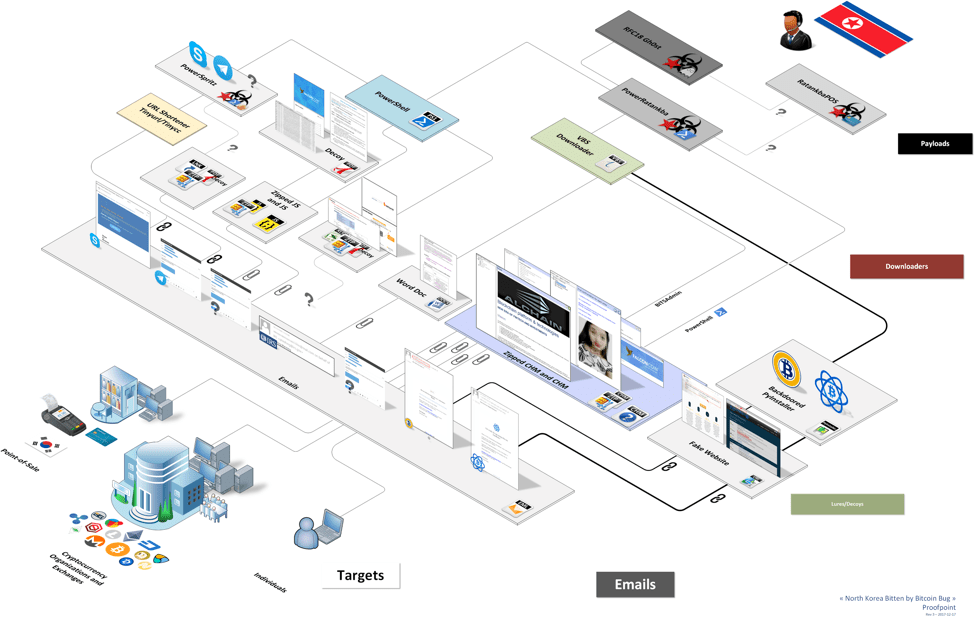Researchers at security firm Proofpoint collected evidence of the significant interest of the Lazarus APT group in cryptocurrencies, the group’s arsenal of tools, implants, and exploits is extensive and under constant development.
Researchers at security firm Proofpoint collected evidence of the significant interest of the Lazarus APT group in cryptocurrencies. The North Korea-Linked hackers launched several multistage attacks that use cryptocurrency-related lures to infect victims with malware.
The malicious code aims to steal credentials for cryptocurrency wallets and exchanges, but there is much more.
“Proofpoint researchers have uncovered a number of multistage attacks that use cryptocurrency-related lures to infect victims with sophisticated backdoors and reconnaissance malware that we attribute to the Lazarus Group.” reads the analysis published by Proofpoint. “Victims of interest are then infected with additional malware including Gh0st RAT to steal credentials for cryptocurrency wallets and exchanges, enabling the Lazarus Group to conduct lucrative operations stealing Bitcoin and other cryptocurrencies.”
The Lazarus APT group has increasingly focused on financially motivated attacks in the attempt to exploit the media interest in the skyrocketing prices for cryptocurrencies.
The activity of the Lazarus Group surged in 2014 and 2015, its members used mostly custom-tailored malware in their attacks and experts that investigated on the crew consider it highly sophisticated.
This threat actor has been active since at least 2009, possibly as early as 2007, and it was involved in both cyber espionage campaigns and sabotage activities aimed to destroy data and disrupt systems. Security researchers discovered that North Korean Lazarus APT group was behind recent attacks on banks, including the Bangladesh cyber heist.
According to security experts, the group was behind, other large-scale cyber espionage campaigns against targets worldwide, including the Troy Operation, the DarkSeoul Operation, and the Sony Picture hack.
Lazarus is believed to be the first nation state attacker that is targeting a point-of-sale using a framework to steal payment card data.
The timing is perfect, the hackers are intensifying their operation around Christmas shopping season.
The arsenal of the Lazarus APT group includes sophisticated custom-made malware, DDoS botnets, and wiper malware.
The research paper published by the experts detail a new implant dubbed PowerRatankba, a PowerShell-based malware variant that closely resembles the original Ratankba implant.
Experts also documented a new and emerging threat dubbed RatankbaPOS targeting the point-of-sale systems.
“The Lazarus Group is a sophisticated, state-sponsored APT group with a long history of successful destructive, disruptive, and costly attacks on worldwide targets. State-sponsored groups are generally focused on espionage and disruption. However, our findings on their recent activities relate to the financially motivated arm of Lazarus, the operations of which are peculiar to the North Korean group.” said Patrick Wheeler, director of threat intelligence, Proofpoint.
“These actions, including the targeting of cryptocurrency exchange credentials and point-of-sale infrastructure, are significant for a number of reasons:
- This appears to be the first publicly documented instance of a state-sponsored actor attacking point-of-sale infrastructure for financial gain.
- Cryptocurrencies are nothing new to threat actors, state-sponsored or otherwise. However, in this case we were able to extensively document the custom-built tools and procedures that Lazarus group is using to perform cryptocurrency theft.
- This group now appears to be targeting individuals rather than just organisations: individuals are softer targets, often lacking resources and knowledge to defend themselves and providing new avenues of monetisation for a state-sponsored threat actor’s toolkit. Bringing the tools and resources of a state-sponsored attack group to bear against individuals and infrastructure used by large numbers of private citizens raises the stakes considerably when assessing potential impact.
- We were able to differentiate the actions of the financially motivated team within Lazarus from those of their espionage and disruption groups that have recently grabbed headlines, providing better insight into their operations and the worldwide threat represented by Lazarus.”


